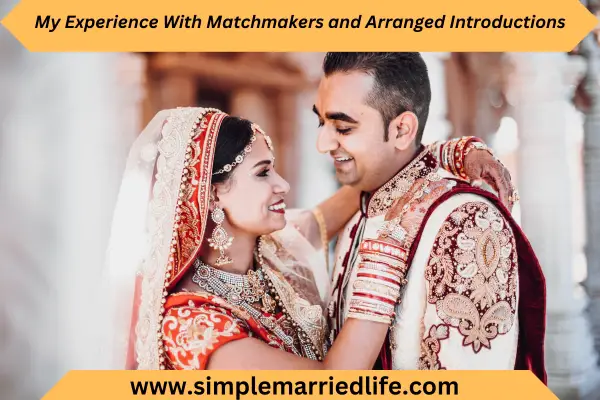Arranged marriages and introductions facilitated by matchmakers have been a cultural tradition in many parts of the world for centuries. Even as attitudes towards relationships evolve, these practices persist in some communities.
As someone who grew up in a culture where arranged matches are common, I have had some personal experiences with this approach to finding a life partner. In this article, I’ll share my perspectives as an insider.
What are Matchmakers and Arranged Introductions?
A matchmaker is a professional who helps connect compatible singles looking for serious relationships. Rather than sorting through profiles yourself, matchmakers hand-pick potential matches based on your preferences and relationship goals.
Matchmaking is personalized – matchmakers get to know you, meet you in person, and continuously follow up. Many specialize in particular demographics such as religion, age, ethnicity, or interests. Matchmaking services range from boutique agencies to online sites.
Arranged introductions also aim to enable singles to meet a compatible life partner. But here, friends, family or community members suggest potential matches instead of a professional matchmaker. Arranged introductions are common in many cultures and communities including Jewish, East Indian, Japanese, and Native American.
The key distinction is that arranged introductions are facilitated by people connected to the single rather than an independent matchmaker. There’s more involvement from loved ones in the process of getting to know a prospective match.
Pros of Matchmaking and Arranged Introductions
1. Pre-screening for compatibility
Rather than endlessly swiping through incompatible matches, matchmakers and loved ones prescreen dates aligned with your vision for a partner. This saves time and energy when looking for “the one.”
2. Personalized service
Matchmakers get to know their clients closely. They leverage their intuition and experience to recommend matches tailored to each individual. A matchmaker acts as your personal relationship headhunter.
3. Community-driven
Friends, family or community play a central role, leveraging their connections and insider knowledge of singles they feel would make a good match. This communal participation adds a layer of support.
4. Deeper criteria
Factors like values, temperament, life vision, family goals get higher priority over superficial attributes. For those uninterested in casual dating, this can lead to more meaningful connections.
5. Takes off pressure
Having an experienced matchmaker or trusted family/friends facilitate introductions can relieve the anxiety, disappointment, and time investment of modern dating.

Cons of Matchmaking and Arranged Introductions
1. Less autonomous
Relying on a matchmaker or family’s input means you have less control over who you meet compared to independently searching for dates. Some people find this a pro rather than a con.
2. Narrow options
A matchmaker cannot possibly know every potential match out there. So you’re limited to their pool of clients or a community’s limited social circles. With online dating, options are endless.
3. Less organic
There’s something to be said for meeting someone “naturally” in person vs. a pre-planned date coordinated by a third party. Serendipitous meetings feel more romantic.
4. Pressure to pick from limited choices
Daters may feel pressured to choose among the few matches recommended instead of holding out for top chemistry. With endless online options, one can be pickier.
5. Costs
Professional matchmaking services can be quite expensive. Arranged introductions have fewer direct costs but families may face social pressures around hosting, gifts etc.
6. Reduced privacy
Having a matchmaker or family involved means reduced privacy around your dating life and relationship details. Some prefer keeping that more discreet.
How Matchmaking Works in My Culture
I come from a traditional family background where arranged marriages continue to be the norm. Here’s a quick overview of how the process typically works:
- Family members or friends suggest potential matches based on criteria like background, profession, values etc.
- If both sides seem interested, the families exchange biodata and horoscopes.
- The prospective bride and groom meet with family members present. This is called a “rishta meeting.”
- If they like each other, they meet a few more times alone to get to know one another.
- If all goes well, the wedding is planned by the families.
The key difference from Western dating is that the families play a major role in selecting and approving potential partners before the couple decides to marry.

My Experiences With Arranged Introductions
Given my family’s traditions, I had a few arranged introductions in my late twenties. Here are some memories that stand out:
The First Rishta Meeting
I was extremely nervous about my first ever Rishta meeting. My parents had shown me a biodata and photo of the prospective groom. On paper, he seemed educated, financially stable, from a good family.
But I knew nothing about his personality or who he really was as a person. I wondered – will we even have a conversation? What if it’s awkward?
To my surprise, he was easy to talk to. We chatted about our careers, hobbies, families. No awkward silences. I was relieved that the meeting went smoothly, even though we both knew there was no match.
The Overeager Matchmaker
A well-meaning aunt offered to set me up with “the perfect boy” – an Ivy League graduate working in finance. I politely declined because I wasn’t interested.
But she kept insisting I meet him, going on about what a “catch” he was and how nicely our horoscopes aligned. It took a few firm but gentle conversations to convince her that we just weren’t a fit.
Going on Intro Dates
After a few initial “rishta meetings”, the next step was to meet one-on-one to get to know each other better. These intro dates felt a bit like interviewing someone for a lifetime partnership.
We’d have polite conversations over coffee or dinner. I tried to balance asking questions to learn more while keeping things light since chemistry can’t be forced.
There were some nice guys, but no sparks. I knew the only reason we met was because our families thought we may make suitable partners on paper.
When Parental Expectations Don’t Align With Yours
Even though my parents had good intentions, some of the matches they liked weren’t based on criteria important to me. For instance, I wanted someone also born and raised outside India to relate to my bicultural experience. But a few introductions were to men who had recently immigrated.
Navigating these loving but conflicting expectations took patience and courageous conversations. I had to stand firm on what I was looking for in a partner.
Tips for Considering Matchmaking or Arranged Introductions
If you’re intrigued by the personal touch of matchmaking or traditions of arranged introductions, some tips:
Keep an open mind
Remember, the matches are suggested because your matchmaker or loved ones believe they meet your needs. Stay open to getting to know diverse personalities.
Offer clear guidance
Communicate your dealbreakers and must-haves to avoid wasting time on mismatched prospects. But also identify areas where you’re flexible.
Take it slowly
Don’t feel rushed into commitment. Follow suggested timelines for getting to know matches before deciding on compatibility.
Trust the process
Believe that your matchmaker or loved ones ultimately want your happiness. But be vocal if any matches seem wildly misaligned.
Balance support with independence
While seeking input from a matchmaker or family, remember dating requires personal chemistry. Don’t ignore your instincts.
Enjoy the experience
Even if no match results, view it as an opportunity to meet new people and learn about yourself.
The hands-on support of matchmaking and arranged introductions appeals to singles frustrated with impersonal swipe apps yet craving meaningful companionship. While relinquishing some autonomy, placing your love life in trusted hands can reap rewards if undertaken with realistic expectations.
Conclusion:
For singles tired of the impersonal world of digital dating, matchmakers and arranged introductions offer a more personalized path to finding love. By relying on the expertise of professionals or the care of loved ones, these traditional approaches help filter prospects for deeper compatibility. However, relinquishing full autonomy over your dating choices can be a downside.
Success requires an open mind, clear preferences, and most importantly – trust the process. While modern romance offers endless options, wisdom suggests that sometimes limiting choices helps the heart find “the one.” Learn here more about arranged marriage guides and tips.


